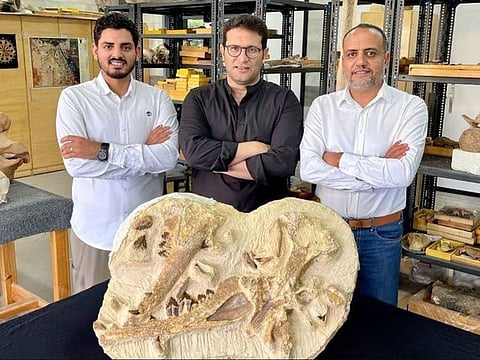Egyptian scientists unearth fossil of 41m-year-old miniature whale
Named 'Tutcetus rayanensis', the specimen offers intriguing insights

Dubai: Paleontologists in Egypt have made a landmark discovery, unearthing a previously unknown extinct species of whale that lived 41 million years ago. This incredible find hails from an era when the whale's ancestors were transitioning from land to the aquatic environment.
Named "Tutcetus rayanensis" in honour of the famed Egyptian boy king Tutankhamun and its discovery site, Wadi El Rayan Protected Area in Egypt's Fayoum Oasis, the specimen offers intriguing insights.
At an approximate length of 2.5 metres (eight feet) and weighing around 187 kilograms (410 pounds), this whale species is notably the smallest of the basilosaurids, ancient whales known to have resided exclusively in water.
Hesham Sallam, team leader from the American University in Cairo (AUC), highlighted the significance of this findinig. He said that this discovery "documents one of the first phases of the transition to a fully aquatic lifestyle".
As per an AUC statement, Sallam added that the basilosaurids showcased fish-like attributes, including a streamlined physique, powerful tail, flippers, and a tail fin. Their most intriguing feature was the remnants of hind limbs, identified as 'legs'. These limbs weren't functional for walking, potentially serving a role in mating rituals.
Erik Seiffert from the University of Southern California, a contributor to the research published in Communications Biology, underscored Egypt's Western Desert's Eocene fossil sites as crucial for grasping the early evolution of whales and their journey towards an entirely aquatic life.
Located about 150 kilometres (90 miles) southwest of Cairo, Fayoum Oasis is home to Wadi Al Hitan, also referred to as the Valley of the Whales. Recognised as a UNESCO World Heritage Site, this region has yielded numerous fossils, portraying some of the most primitive whale forms. Historically, during the Eocene period (56 to 34 million years ago), the present-day oasis was submerged under a tropical sea.
Sign up for the Daily Briefing
Get the latest news and updates straight to your inbox



